To Your Health!
University of Houston Embraces Unique Approach to Health Care
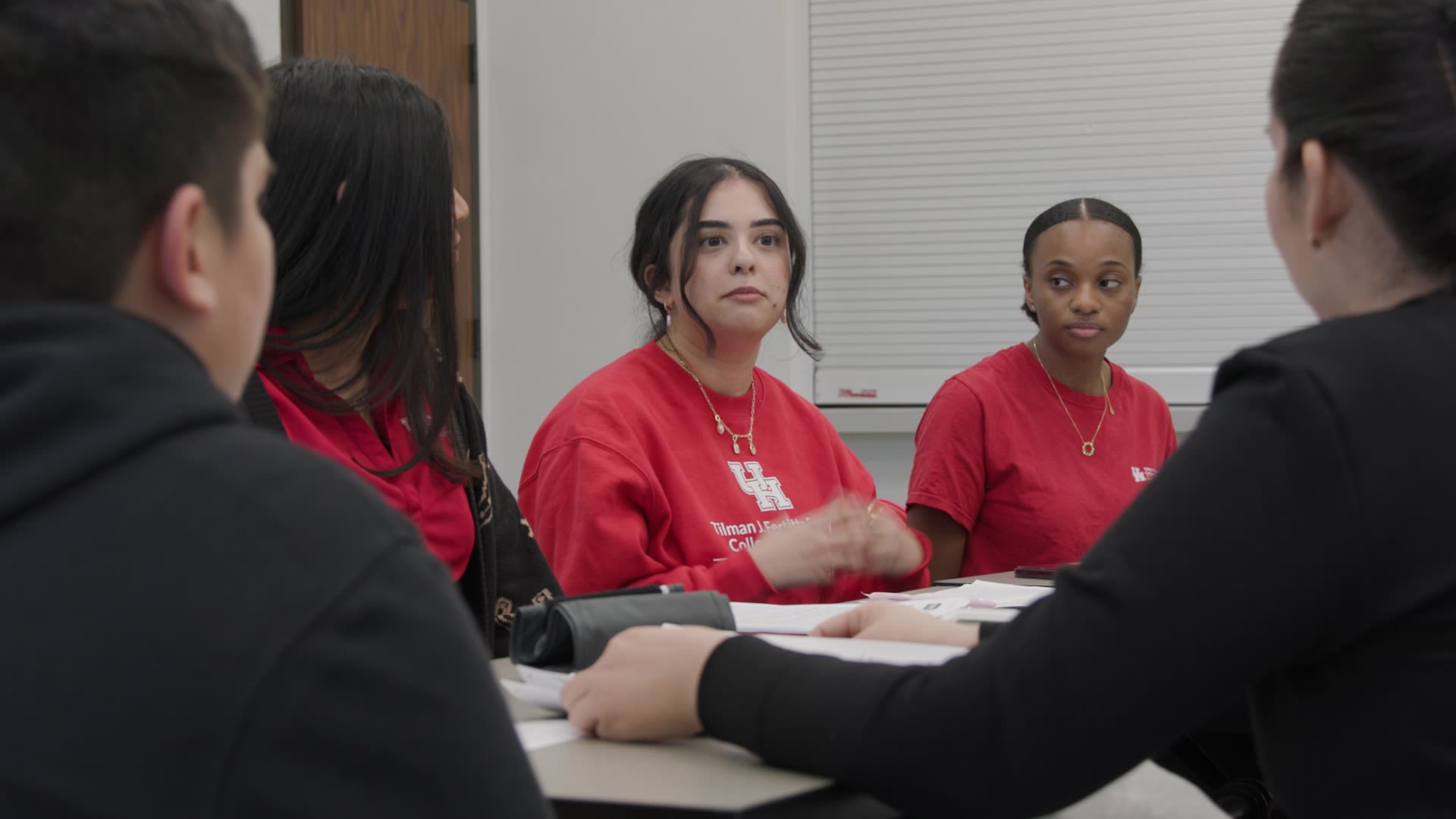
interdisciplinary health care (noun)
1. a collaborative approach to patient care that involves multiple medical professionals working together across specialties.
2. the foundation of the University of Houston’s commitment to reducing health disparities and improving health behaviors and outcomes in underserved populations locally, nationally and globally.
Auset Hutcherson remembers the exact moment her life changed.
It was November 2023, and Hutcherson, along with her husband, was feeling overwhelmed. As residents of Houston’s historic Third Ward neighborhood, they were facing serious health challenges, coordinating care across multiple specialists without the guidance of a primary care provider — all while raising a family.
Then came a turning point: a referral to the University of Houston’s Family Care Center.
“My whole family needed support — physically, mentally and socially,” Hutcherson says. “After years of searching, we found it all in one place at UH. Their collaborative, holistic approach to health care is transforming one family at a time.”
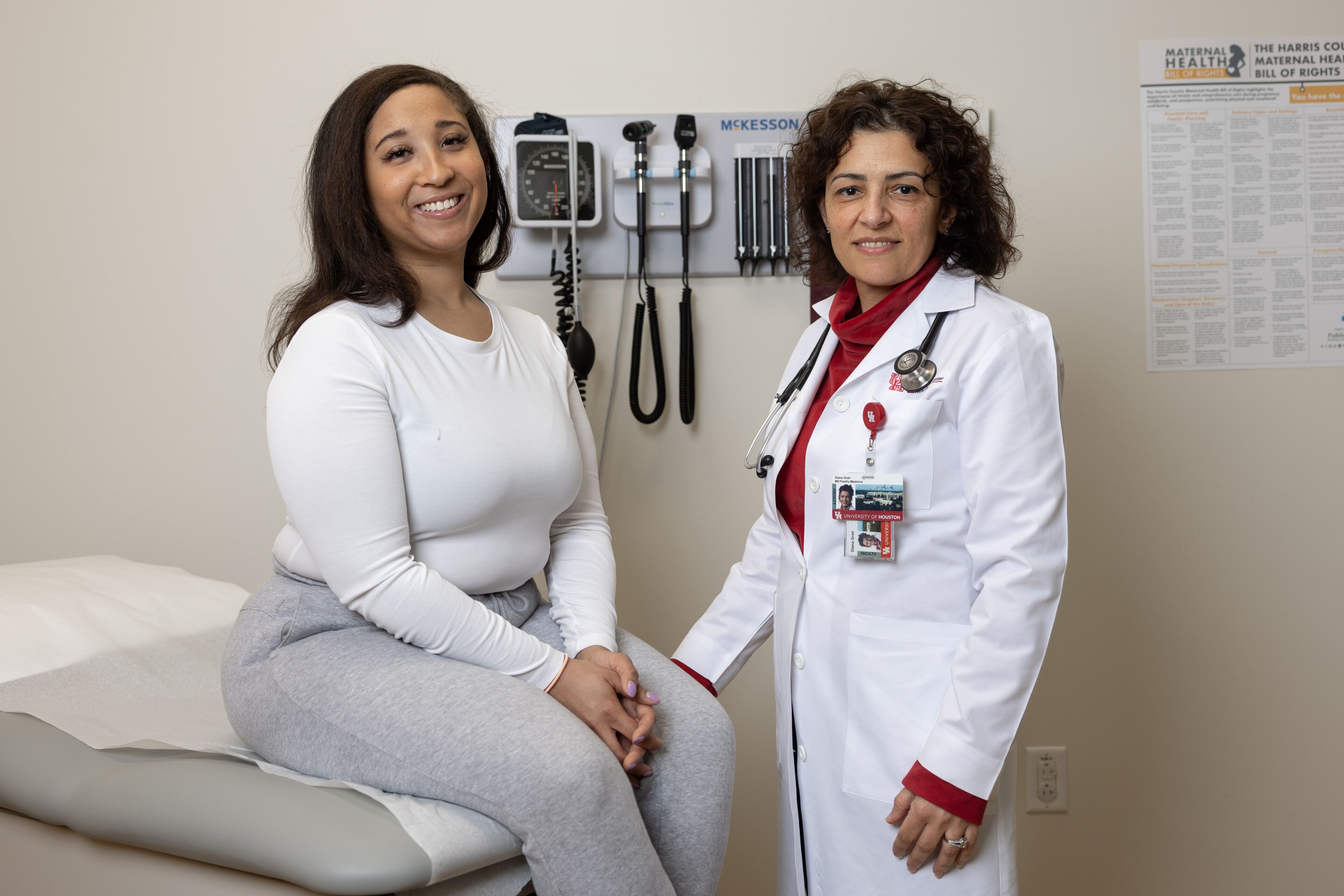
This interdisciplinary model of care is the heart of the University’s mission to improve health outcomes and close gaps in access for underserved communities. By uniting students and faculty from medicine, behavioral health, nursing, pharmacy, optometry, social work and other fields, the University is addressing the complex web of factors affecting health. The result? Comprehensive, culturally competent care tailored to meet the unique needs of diverse populations.
“Our nation’s health care system faces immense challenges,” says Dr. Jonathan McCullers, vice president of health affairs at UH and dean of the Tilman J. Fertitta Family College of Medicine. “Despite spending more on health care than any other country, the U.S. continues to lag behind other developed nations in health outcomes.
Dr. Diana Grair examines her patient, Auset Hutcherson, at the University of Houston’s Family Care Center.
Dr. Diana Grair examines her patient, Auset Hutcherson, at the University of Houston’s Family Care Center.
UH is tackling these challenges head-on through interdisciplinary education and clinical practice that focus on quality of care and patient outcomes rather than the quantity of services provided.
“The innovative solutions we’re fostering are making real-world impacts for both our students and the communities we serve across Houston, Texas and beyond.”
Dr. Jonathan McCullers, vice president of health affairs at UH and dean of the Tilman J. Fertitta Family College of Medicine
Dr. Jonathan McCullers, vice president of health affairs at UH and dean of the Tilman J. Fertitta Family College of Medicine
This interdisciplinary model of care is the heart of the University’s mission to improve health outcomes and close gaps in access for underserved communities. By uniting students and faculty from medicine, behavioral health, nursing, pharmacy, optometry, social work and other fields, the University is addressing the complex web of factors affecting health. The result? Comprehensive, culturally competent care tailored to meet the unique needs of diverse populations.
“Our nation’s health care system faces immense challenges,” says Dr. Jonathan McCullers, vice president of health affairs at UH and dean of the Tilman J. Fertitta Family College of Medicine. “Despite spending more on health care than any other country, the U.S. continues to lag behind other developed nations in health outcomes.
UH is tackling these challenges head-on through interdisciplinary education and clinical practice that focus on quality of care and patient outcomes rather than the quantity of services provided.
“The innovative solutions we’re fostering are making real-world impacts for both our students and the communities we serve across Houston, Texas and beyond.”
Dr. Diana Grair examines her patient, Auset Hutcherson, at the University of Houston’s Family Care Center.
Dr. Diana Grair examines her patient, Auset Hutcherson, at the University of Houston’s Family Care Center.
Dr. Jonathan McCullers, vice president of health affairs at UH and dean of the Tilman J. Fertitta Family College of Medicine
Dr. Jonathan McCullers, vice president of health affairs at UH and dean of the Tilman J. Fertitta Family College of Medicine
The Future of Health Care Is Here
When the Fertitta College of Medicine welcomed its inaugural class of 30 students in 2020, it marked the opening of Houston’s first new medical school in 50 years. But this milestone was part of a larger vision — a campus-wide commitment to health education, research and innovation that spans nearly 80 years and involves 15 of the University’s 16 colleges.
“We are uniquely positioned to lead in teaching and delivering interdisciplinary care," McCullers says. “With our long history of health programs and the unparalleled advantage of having the Texas Medical Center — the world’s largest medical center — right in our backyard, we are not only preparing our students to address the most complex health challenges but also directly serving the needs of underserved communities who, statistically, face the worst health outcomes."
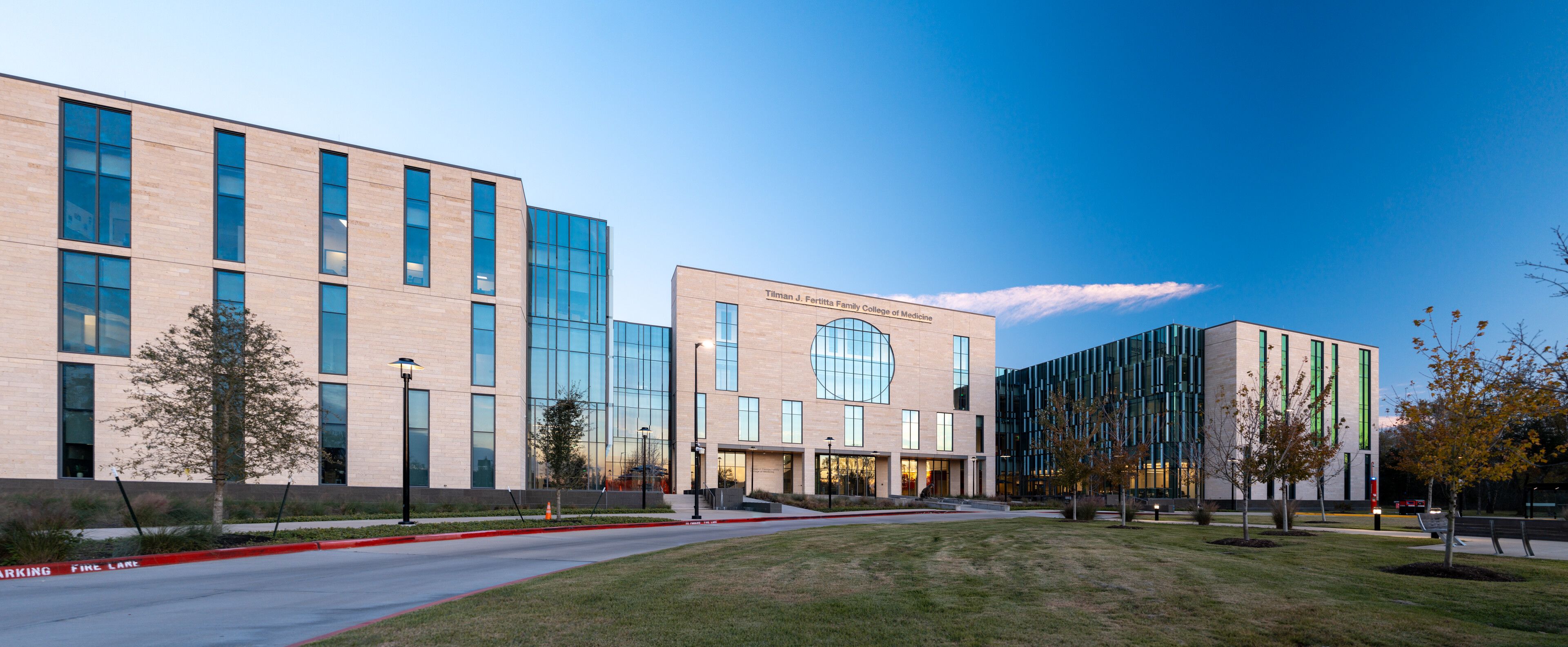
The demand for health-related education has surged since the COVID-19 pandemic, and UH is answering the call. One in four of the University’s 48,000 students is pursuing one of more than 80 health-related degree programs. Over the past seven years, the number of health-related degrees awarded has grown more than 30%, with 85% of graduates staying to work in Texas. Meanwhile, federal research funding from the Department of Health and Human Services — including the National Institutes of Health — has increased by 96%.
“We’re building something extraordinary here,” McCullers says. “It’s an exciting time to be at UH.”
“We’re building something extraordinary here. It’s an exciting time to be at UH.”
Dr. Jonathan McCullers, vice president of health affairs at UH and dean of the Tilman J. Fertitta Family College of Medicine
The Future of Health Care Is Here
When the Fertitta College of Medicine welcomed its inaugural class of 30 students in 2020, it marked the opening of Houston’s first new medical school in 50 years. But this milestone was part of a larger vision — a campus-wide commitment to health education, research and innovation that spans nearly 80 years and involves 15 of the University’s 16 colleges.
Tilman J. Fertitta Family College of Medicine
Tilman J. Fertitta Family College of Medicine
“We are uniquely positioned to lead in teaching and delivering interdisciplinary care," McCullers says. “With our long history of health programs and the unparalleled advantage of having the Texas Medical Center — the world’s largest medical center — right in our backyard, we are not only preparing our students to address the most complex health challenges but also directly serving the needs of underserved communities who, statistically, face the worst health outcomes."
We’re building something extraordinary here. It’s an exciting time to be at UH.”
Dr. Jonathan McCullers, vice president of health affairs at UH and dean of the Tilman J. Fertitta Family College of Medicine
The demand for health-related education has surged since the COVID-19 pandemic, and UH is answering the call. One in four of the University’s 48,000 students is pursuing one of more than 80 health-related degree programs. Over the past seven years, the number of health-related degrees awarded has grown more than 30%, with 85% of graduates staying to work in Texas. Meanwhile, federal research funding from the Department of Health and Human Services — including the National Institutes of Health — has increased by 96%.
“We’re building something extraordinary here,” McCullers says. “It’s an exciting time to be at UH.”
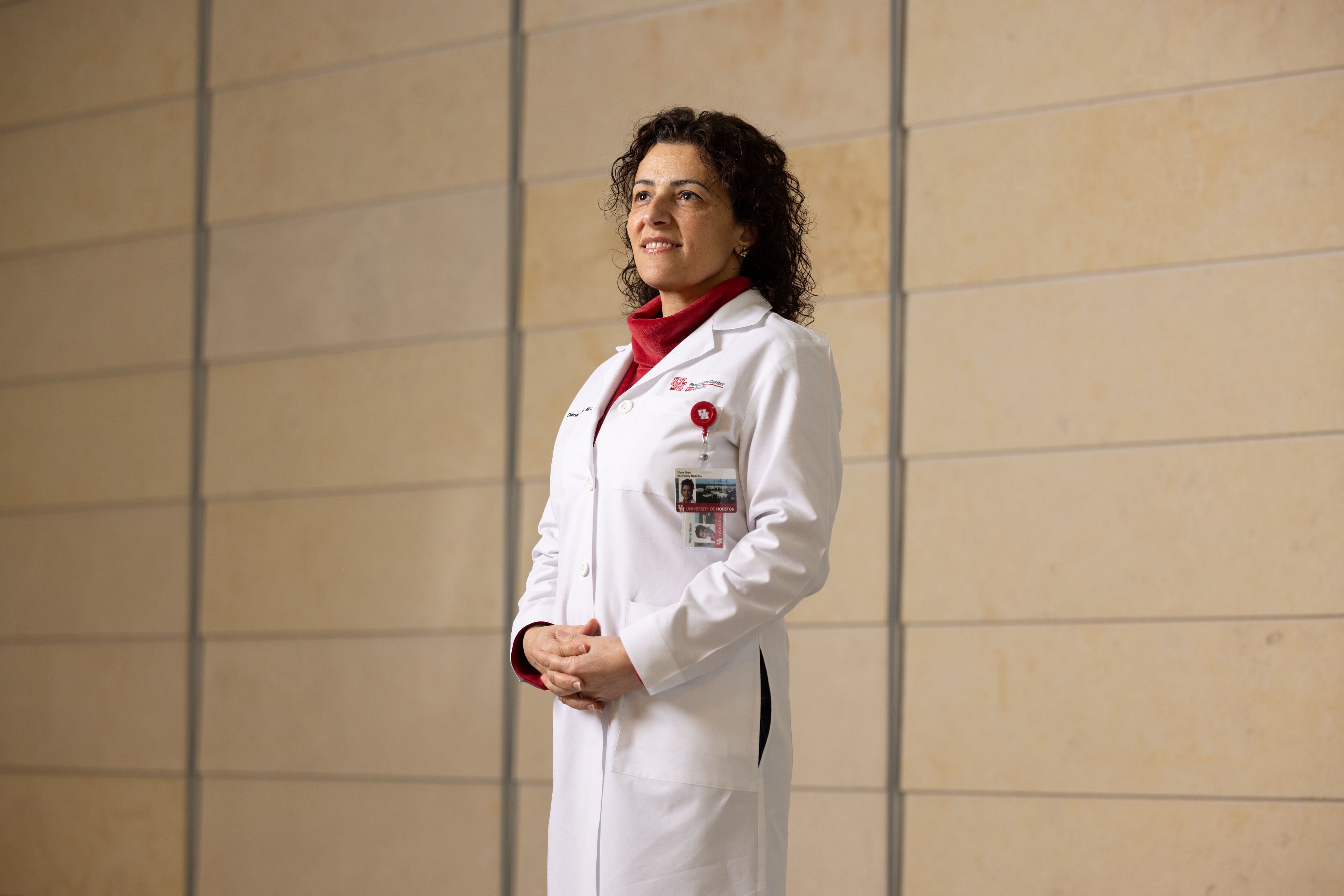
Putting Families First
One of the pillars of UH’s interdisciplinary, value-based health care model is the Family Care Center, an on-campus health clinic that provides affordable, comprehensive and integrated primary care and mental health services to the UH community and surrounding neighborhoods, including areas with some of the highest rates of chronic disease in Harris County.
Staffed by faculty physicians, psychologists and students, the Family Care Center is a place where Austel Hutcherson can go for all of her and her family’s health care needs — from behavioral health and pediatrics to internal medicine and obstetrics.
Dr. David Curtis talks with patient Auset Hutcherson in an exam room.
Dr. David Curtis talks with patient Auset Hutcherson in an exam room.
Ayesa Javed assists Emilio Patino with a blood pressure device. Students from the Tilman J. Fertitta Family College of Medicine visit a client family of the household centered care program at the Pasadena public library.
Ayesa Javed assists Emilio Patino with a blood pressure device. Students from the Tilman J. Fertitta Family College of Medicine visit a client family of the household centered care program at the Pasadena public library.
“It’s a place where we are being treated, rehabilitated, restored and empowered, and we are grateful for everything they do to support us.”
Austel Hutcherson
“We may struggle with social and economic barriers, but we know we have a team that believes in us and wants to see us thrive,” Hutcherson says. “It’s a place where we are being treated, rehabilitated, restored and empowered, and we are grateful for everything they do to support us.”
“We have 18 providers specializing in pediatrics, adult and senior health, women’s health, and psychology and psychiatry,” says Dr. Diana Grair, medical director for the clinic. “Improving their health and well-being and helping them secure services that extend beyond their medical needs has been very rewarding and is aligned with the mission of the University.”
Aside from providing the perfect learning experience for students, the clinic’s welcoming environment has been key to its success.
“What keeps patients coming back and what keeps us receiving new patients is the culture that we have built here,” says Danielle Brownlee, senior director of clinic operations. “Our leadership, our faculty and our students are delivering on our mission to improve health and health care in these underserved populations.”
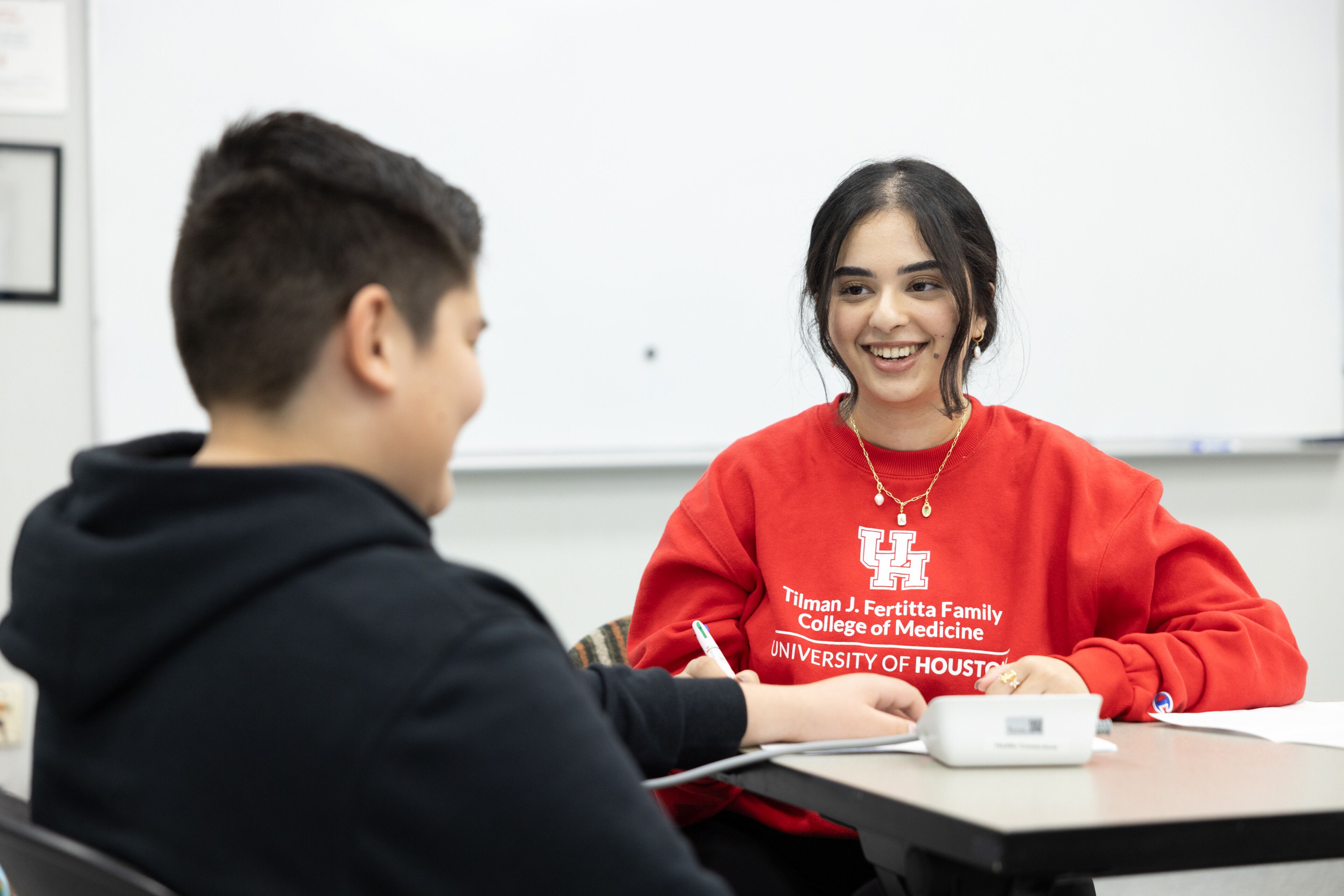
Game Changing Community Care
UH’s approach to health care extends well beyond classrooms and clinics.
The Household-Centered Care program combines students from different health-related fields with trained community health workers to visit families in two communities with the poorest health outcomes in Houston — the East End and Third Ward — and coordinate their care, addressing each family’s health and social service needs.
For Litania Patiño’s family, the program has been a gamechanger.
“Household-Centered Care has helped us tremendously,” said Litania Patiño. “Not only are we learning about social programs, disease prevention and a healthier lifestyle, but we’re able to share this information with other families who need it. It’s improving the well-being of the entire community.”
Making house calls gives the students a whole new perspective.
“When students are in the clinics and hospitals, they only see the patient,” says Claudine Johnson, clinical associate professor in the Fertitta College of Medicine and course director of the Household-Centered Care program. “But on household visits, they see the neighborhood and the home environment which helps them better understand why people make the choices they do about their health.”
Susan Guajardo talks with Litania Patino and Emilio Patino during a household centered care program visit.
Susan Guajardo talks with Litania Patino and Emilio Patino during a household centered care program visit.
Students from the Tilman J. Fertitta Family College of Medicine visit the Patino family of the household centered care program at the Pasadena public library.
Students from the Tilman J. Fertitta Family College of Medicine visit the Patino family of the household centered care program at the Pasadena public library.
Sentreal Gregory, a first-year medical student who grew up in Third Ward, is excited for the chance to give back to her community.
“It is such a rewarding experience to go into these neighborhoods and help families that are very vulnerable,” Gregory says. “As we identify their needs and where we can offer support, we are building trust between the University of Houston, the College of Medicine and the community.”
Ayesha Javed, a first-year medical student from Sugar Land, agrees.
“I was moved by the way the program empowers families by addressing not just their medical needs, but also the social determinants of health that so often go unnoticed,” Javed says. “It’s about more than treating symptoms — it’s about connecting with people in their environments and supporting them to live healthier lives.”
“It is such a rewarding experience to go into these neighborhoods and help families that are very vulnerable.”
Sentreal Gregory
“It is such a rewarding experience to go into these neighborhoods and help families that are very vulnerable.”
Sentreal Gregory
Sentreal Gregory, a first-year medical student who grew up in Third Ward, is excited for the chance to give back to her community.
“It is such a rewarding experience to go into these neighborhoods and help families that are very vulnerable,” Gregory says. “As we identify their needs and where we can offer support, we are building trust between the University of Houston, the College of Medicine and the community.”
Ayesha Javed, a first-year medical student from Sugar Land, agrees.
“I was moved by the way the program empowers families by addressing not just their medical needs, but also the social determinants of health that so often go unnoticed,” Javed says. “It’s about more than treating symptoms — it’s about connecting with people in their environments and supporting them to live healthier lives.”











